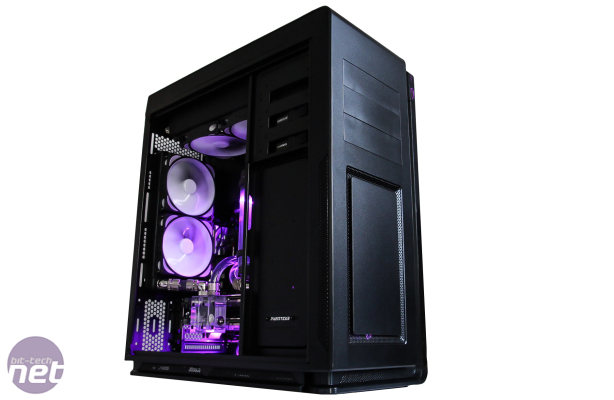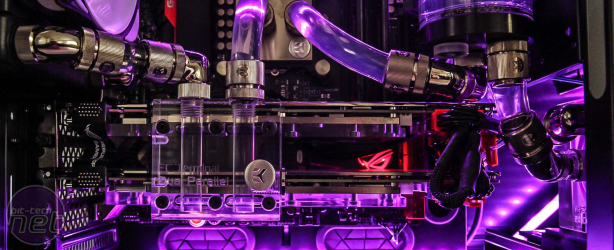Overclockers UK Infin8 Nebula Gaming PC Review
March 6, 2015 | 14:08
Companies: #asus #ek-water-blocks #overclockers-uk #phanteks

Performance Analysis
As we've introduced a selection of new benchmarks plus the fact that most of our dedicated test system results aren't directly comparable to Nebula, some graphs are a little thin at the moment but we'll be adding to these as we test more systems. We'll start with the games tests - while our graphics test system uses a different CPU, the results should be fairly comparable since the benchmarks are predominantly GPU limited. With two GTX 980s in tow, it's no surprise to see the Nebula dominating the benchmarks with a clear lead over AMD's Radeon R9 295X2 and performing close to double the speed of a single stock speed GTX 980, with ample headroom even at 3,840 x 2,160, aka 4K, in both Crysis 3 and Battlefield 4.It was a similar story in Unigine Valley, where the Nebula powered its way to a lofty score of 6,297 - more than double that of a single GTX 980. Here, it's possible the influence of Windows 8, more recent drivers and a faster CPU can come into play compared to our standard graphics test system. The CPU itself is pretty much as far as you'd want to go in overclocking terms for an everyday system, but its benefits are clear to see. It was faster than a stock speed Core i7-5930K in the PCMark 8 4K Video Editing test and only just behind in the Photo Editing test too.
Click to enlarge
In fact the performance can be summarised by saying that the Core i7-5930K is a little quicker in most benchmarks but the Nebula's 4.6GHz Core i7-4790K is never far behind, even in multi-threaded tests such as Terragen 3 and Cinebench R15. Our power consumption figures for systems use a combined Prime 95 small FFT test and Unigine Valley benchmark run to give a peak power draw. This means that the result isn't comparable to our CPU or graphics tests (where we use either Prime 95 or Valley respectively, but not both at the same time).
However, for comparison, Cyberpower's Achilles Pro 4K system that we looked at last summer uses a similarly-clocked Core i7-4790K plus a single GTX 780. The latter only used 30W less under load, despite using a single GPU. The reasons for this are actually quite simple. Cyberpower not only used a much higher CPU voltage than Overclockers UK (1.28V compared to 1.235V) but the GTX 780 is also a much more power-hungry card than the GTX 980. The idle power draw was much lower too, most likely due to the lower CPU voltage and different CPU power settings.
The storage benchmarks again aren't directly comparable to our usual test results as we use Windows 7 on a fresh SSD, whereas the Nebula uses Windows 8 and uses the SSD as the OS install. Unsurprisingly the Nebula was a little slower than a fresh 250GB SSD 850 EVO but as we're sure you'll agree, this would certainly be our choice if we were building our own system. You can see our review and how the 850 EVO compares to other SSDs in our review.
Noise-wise, the system is blissfully quiet and doesn't ramp up at all during games. There's only a slight airflow noise coming from the fans but even sat next to you on a desk, you quickly forget it's there. The cooling system did a pretty good job at dealing with the CPU and GPUs too. The highest GPU delta T we saw was 16°C, with a recorded temperature in GPU-Z of just 37°C. The CPU was a fair bit warmer at a recorded peak core temperature of 89°C or delta T of 68°C. This is pretty toasty but this is after a couple of hours of running flat out in Prime 95's small FFT test with a 4.6GHz overclock.
Click to enlarge
Conclusion
The obvious starting point for a pre-built PC is value; can you build the PC for less? A quick totalling up of the core components arrives at a figure of £1,900 and that's excluding all the cooling hardware. That's not a bad deal at all when you start delving into the price of some of the water-cooling components. For instance, the two GTX 980 full cover waterblocks are £100 a piece when you include the backplates too, and the Noiseblocker fans are £16 each as well - that's £80, plus over £140 for the two radiators. Throw in a pump, pump top, a mass of fittings, a reservoir, coolant, CPU waterblock, tubing, some RGB LED strips and you're well on the way to the asking price.The rest, of course, is what you actually pay someone to build the system and this is no mean feat for a two-way graphics system and two radiators. You're looking at most of a day from start to finish - probably more if you factor in leak testing and stress testing too. Add on a three year warranty and it's pretty clear how Overclockers UK gets to the asking price a little over three grand.
Is the system actually any good? That's a resounding yes. It looks fantastic, includes hardware that we'd probably have picked ourselves anyway, and is the perfect partner for a 4K monitor with loads of headroom here, even in Crysis 3. It's a monster in 2D workloads too, giving more expensive CPUs such as the Core i7-5930K a run for their money. The CPU does get pretty toasty if you're stress-testing, but most of the time it sits around 60°C or a delta T of 40°C during games, and the GPUs are wonderfully cool-running.
Our only real qualms are the cable tidying, which could be a bit neater round the back but seeing as it's out of sight completely, we can't really dock too many points here. It would also have been nice to see a larger SSD and perhaps a dedicated sound card - Overclockers UK has told us that's happy to tailer-make your system if you call them prior to purchase though. Otherwise, the Overclockers UK Infin8 Nebula is a stunning PC that's perfect for anyone wanting a water-cooled 4K-capable system but doesn't have the time or experience to build one themselves.

-
Speed24 / 25
-
Design23 / 25
-
Hardware22 / 25
-
Value22 / 25


MSI MPG Velox 100R Chassis Review
October 14 2021 | 15:04










Want to comment? Please log in.